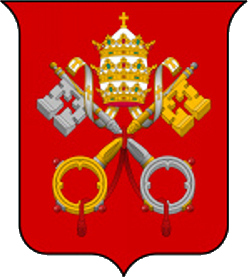The justification for the Papacy's power is found within its emblem, which are two keys that cross each other. They symbolize the "binding and loosing" authority Catholics believe the Lord gave to them. Surprisingly, Catholics base their perceived power through some keys to the kingdom on just two Biblical passages.
And I say also unto thee, That thou art Peter . . . And I will give unto thee (this was given to ALL the disciples, see Matthew 18:1, 18) the keys of the kingdom of heaven: and whatsoever thou shalt bind on earth (represented in the Papacy's emblem as a red ribbon tied around two keys) shall be bound in heaven: and whatsoever thou shalt loose on earth shall be loosed in heaven (Matthew 16:18 - 19, KJV).
A closer look at the original Greek text from which the above verses are translated from, however, shows that the Catholic Church's teaching on this subject is not based on the Bible! The book "Basics of Biblical Greek Grammar" by William Mounce states that what seems to be a unilateral binding and loosening power given to the disciples is something different.

. . . the actions described in heaven are future perfect passives - (a better translation of which would be) 'will have already been bound in heaven' . . . the heavenly decree (by God) confirming the earthly one (made by the disciples) is based on a prior verdict (Page 121).
This means God did not give any keys to the first century disciples and did not promise to back all decisions made by them even if they were against his will. Rather, if the disciples decided something based on what God had already decreed or that was already in his will, he would back the decision.
A good way to think about this teaching is through the example of a Judge. The job of the average modern Judge is to use existing laws and previous decisions (precedence) as a base from which a decision can be made in a particular case. Their job is not to create laws or make decisions that totally contradict existing rules of law. God only backed the disciples if a decision was based on his already existing laws, commandments and statutes.
What Authority Did Jesus Give?
The Bible truth is that Christ did not endow any of his followers with any "keys" that gave them unilateral power to make decisions that are binding on others, especially those against scripture, as if they were ruling God's kingdom on earth.
Jesus specifically stated that his Father's laws were not abolished. Rather, God's words in the Law, Prophets or Psalms are still the standard by which any decision must be judged against (see Matthew 5:17 - 19).
Whatever is decided within the church cannot be contradictory to God's commandments. As Matthew 5 states, those who break the commandments and teach others to do so as well are the least!
Jesus, however, did give the disciples the power to release people from the sometimes silly religious traditions others taught that were not supported in the Bible (see Mark 7:1 - 13, etc.).
Any fellowship, church or denomination that, in its decisions, endorses sin, is doing so against what the Bible teaches and against God's will. Such sinful decisions are nothing more than man's inventions and are not backed in heaven above.
God has never given a single human, not even Peter, or a single church, the keys to the kingdom. No human has the sole authority to make decisions for all. Any decision made by those in the church has to be in harmony with the Bible.
Among the list of decisions God has specifically stated he will not honor or uphold no matter who on earth makes them includes leading people to worship pagan gods or endorsing the worship of idols (Exodus 20:2 - 6, 1Corinthians 10:14, 20 - 21, etc.).
God will also not uphold any decision that adds or takes away from his Word (Deuteronomy 12:30 - 32, Revelation 22:18 - 19), adopts pagan worship practices and holidays (e.g. worship on Sunday, Christmas, Easter) and so on.
The True Keys
The true meaning of the phrase "keys to the kingdom" means that all those who serve God have the ability to share the truth with others and spread the gospel. Repentance and conversion, along with living a life as an obedient and faithful Christian, opens the door to eternal salvation.